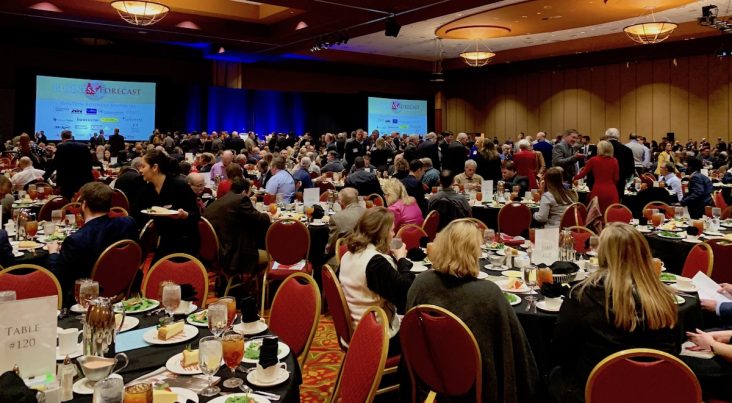Trade concerns, opioid crisis, lack of R&D investment seen as risks to economic growth
by February 1, 2019 4:45 pm 697 views

Guests attend the Economic Forecast Luncheon presented by the University of Arkansas Center for Business and Economic Research on Feb. 1, 2019, at the John Q. Hammons Center in Rogers. FILE PHOTO
More than 1,000 business professionals from around the state attended the Business Forecast Luncheon presented by the University of Arkansas Center for Business and Economic Research on Friday (Feb 1) to hear a positive overall forecast with cautionary risks related to trade wars and a shrinking labor force in part due to the opioid crisis.
Dr. Carolyn Evans, head economist and senior data scientist at Intel Corp., gave the audience a 20,000-foot view of the world economy, which she said impacts Arkansas and its metro areas at higher levels because supply chains are global.
Evans predicted global economic growth will soften in 2019, thanks in part to a slowing in China. She said global business sentiment has declined in recent months as China continues to shrink its manufacturing base, and reduce debt and government investments in business. She said the uncertainty around trade policy is a hindrance to the many economies around the world.
Evans pegs global GDP growth of between 2.7% and 3.5%, down slightly from 2018. She said the U.S. should lead in the growth with a bigger role than in recent years amid China’s slow down.
NATIONAL PERSPECTIVE
Ross DeVol, a fellow at the Walton Family Foundation, spoke on the U.S. economy and the need for more research and development spending by corporations, governments and universities to ensure the U.S. and Arkansas economies are able to keep growing.
He said China, even in a slowing posture, will invest more dollars in R&D than the U.S. this year, making big bets on innovations like 5G connectivity, artificial intelligence and seed breeding in agricultural applications.
DeVol said Utah is a model for Arkansas to follow as the state has become a major hub for innovation because of its commitment to R&D spending and growing its STEM workforce by graduating more engineers over a five- to eight-year period. He said the state made an investment and Brigham Young University and the University of Utah tripled the number of engineers in that period. He said incubators were created and there were more efforts to increase research and then transfer that to commercial applications.
He said the nation has a whole is seeing the number of startups decline and the share of younger companies has also fallen. He said those who invest in R&D and STEM educated workforces are positioning themselves to win long term. DeVol said Arkansas has a long way to go as does most of the country.
DeVol’s economic predictions for the U.S. economy in 2019 show GDP growth at 2.6%, down from 2.9% in 2018. He said consumption will be less at 2.6%, business fixed investments are forecast at 5.4%, down from 5.5% in 2018. Exports are projected to be lower at 2.3% amid high U.S. dollar and trade barriers. He expects imports will be higher at 6%, up from 4.8% in 2018 and government spending is up at 4%, behind the stimulus. DeVol pegs the recession risk in 2019 at 25%.
STATE AND LOCAL VIEW
Mervin Jebaraj, director for CBER at the UA, told Talk Business & Politics he would give the local Northwest Arkansas economy a letter grade of “A-” to start the year. He said the region should hold its own for the year, but overall growth will be down a bit compared to a very strong 2018.
He said Arkansas gets a letter grade of “B.” He said pockets of growth should continue to come from the Northwest, Central and Jonesboro metro areas. He said the Fort Smith metro area is sluggish with slow, to no substantial growth expected. Fort Smith is deemed a mature and stable market with moderate risks to manufacturing jobs should trade concerns continue.
Jebaraj said the state’s low unemployment rate is a positive but the shrinking labor force is a concern because it can impede future population growth in areas like Northwest Arkansas and Jonesboro. He said Arkansas is projected to add between 10,000 and 11,000 jobs in 2019, with half of those in Northwest Arkansas. He said Northwest Arkansas’ job growth tapered a from last year and that will likely mean the population growth follows that trend.
He said Jonesboro and Central Arkansas will add jobs while Fort Smith should remain steady. Pine Bluff is expected to lose more jobs in 2019. Jebaraj pointed to a couple of factors believed to impairing the labor force growth amid a strong economy. He said the opioid addiction crisis has taken roughly 40,000 people out of the Arkansas workforce since 1999. He said there is a lot of ink spilled on this issue but little is being done to attack this concern.
DeVol said the obesity crisis is also a drag on labor force growth. He said counties with the highest obesity ratings also tend to have the lowest workforce numbers and the costs to those communities and employers is huge because of the health complications related to obesity.
